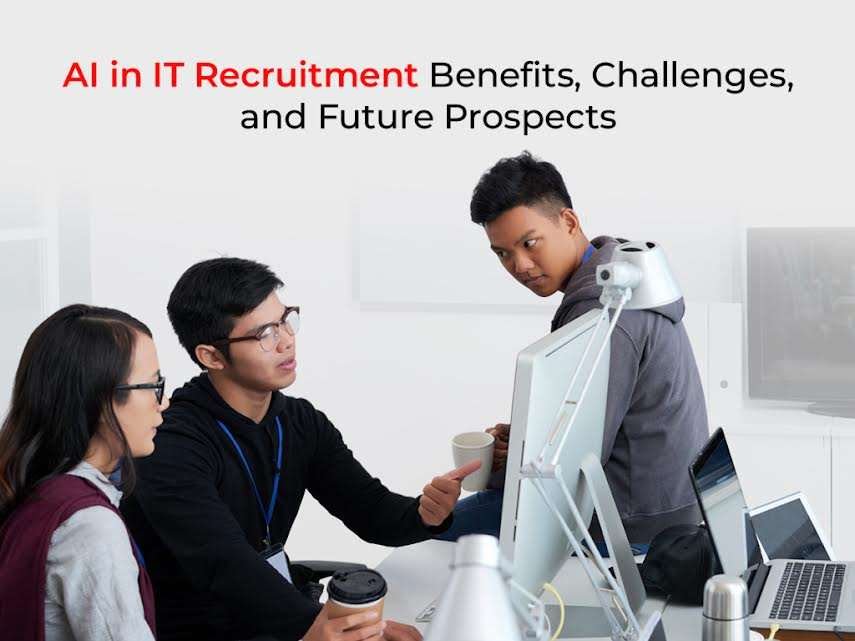
The coordination of artificial intelligence (AI) in the recruitment scene has changed how associations, especially IT recruitment companies, distinguish and recruit ability. As the interest for gifted experts in the IT area keeps to develop, utilizing computer-based intelligence advancements offers critical benefits while introducing extraordinary difficulties.
This blog explores the benefits, challenges, and prospects of AI in IT staffing.
Benefits of AI in IT Recruitment
-
Enhanced Efficiency and Speed
One of the most remarkable advantages of artificial intelligence in recruitment is its capacity to radically decrease the time taken to handle applications. Customary techniques frequently include physically filtering through hundreds or thousands of resumes, an undertaking that can be both tedious and inclined to human blunder. AI-powered tools apparatuses can separate resumes in seconds, recognizing applicants who meet explicit standards in light of watchwords and abilities. This proficiency permits enrollment specialists to zero in on essential assignments as opposed to regulatory ones.
-
Improved Candidate Experience
The utilization of AI can essentially upgrade the candidate experience by smoothing out correspondence and giving ideal updates all through the employing system. Automated systems can send notices about application status or interview plans, guaranteeing up-and-comers feel educated and esteemed. A positive competitor experience is critical for drawing in top ability, particularly in cutthroat fields like IT.
-
Data-Driven Decision Making
AI tools generate huge measures of information that can give experiences into enlistment patterns and applicant conduct. This information empowers IT recruitment companies to go with informed choices given prescient examination, which can gauge competitor achievement and degrees of consistency. By examining past employing examples and execution measurements, associations can refine their enrollment techniques for improved results.
-
Diversity and Inclusion
AI can decrease predisposition in employing processes by zeroing in on candidate capabilities as opposed to segment factors. By using calculations intended to advance variety, associations can make a more inclusive workforce. This is especially significant in IT, where various groups have been displayed to drive development and further develop critical thinking abilities.
-
Scalability
As organizations develop, so does their requirement for ability. AI tools can undoubtedly scale enlistment endeavors without a relative expansion in assets. For example, automated sourcing tools can examine worksheets and online entertainment stages to distinguish likely up-and-comers at scale. This versatility guarantees that associations can rapidly adjust to changing employment needs.

Challenges of AI in IT Recruitment
-
Implementation Costs
While AI offers various advantages, the underlying speculation expected for carrying out these innovations can be critical. Numerous IT staffing firms might confront difficulties in supporting these expenses against their financial plan imperatives. Also, progressing support and updates are important to keep these systems working ideally.
-
Data Privacy Concerns
The use of AI in recruitment raises important questions about data privacy and security. Organizations must ensure that they comply with regulations such as GDPR when handling candidate information. Failure to protect sensitive data can lead to legal repercussions and damage a company’s reputation.
-
Dependence on Technology
Over-dependence on AI tools might prompt a decrease in human judgment during the recruiting system. While AI can help with introductory screenings, it can’t supplant the nuanced understanding that accomplished enrollment specialists bring to applicant assessments. Finding some kind of harmony between innovation and human understanding is critical for viable recruiting.
-
Bias in Algorithms
Although AI has the potential to reduce bias, it can also perpetuate existing biases if not properly managed. Algorithms are trained on historical data; if this data reflects biased hiring practices, the AI may replicate these biases in its recommendations. Continuous monitoring and updating of algorithms are essential to mitigate this risk.
-
Skill Gap
The rapid evolution of AI technologies requires recruiters to possess a certain level of technical expertise to effectively utilize these tools. There may be a skill gap within HR teams that could hinder the successful implementation of AI solutions. Training and development programs are necessary to equip staff with the skills needed for the effective use of AI.
Future Prospects
The future of AI in IT recruitment looks promising as technology continues to evolve. Here are some anticipated trends:
-
Increased Adoption of Machine Learning
As machine learning algorithms become more sophisticated, their application in recruitment will likely expand beyond resume screening to include more complex tasks such as predicting cultural fit and long-term success within an organization.
-
Integration with Other Technologies
Future advancements might see more noteworthy integration between AI recruitment tools and other HR technologies, for example, onboarding systems or representative execution of the board programming. This all-encompassing methodology could smooth out HR processes further and improve general hierarchical proficiency.
-
Enhanced Personalization
With advancements in natural language processing (NLP), AI tools will become better at personalizing communication with candidates based on their profiles and interactions. This could lead to more engaging candidate experiences that resonate with individuals’ preferences.
-
Focus on Soft Skills Assessment
As specialized abilities become progressively normalized through certificates and schooling, there will be a developing emphasis on surveying delicate abilities like correspondence, cooperation, and versatility during the enlistment cycle. AI tools examine video meets or evaluate character qualities will assume a basic part in this shift.
-
Ethical Considerations
As associations become more mindful of moral ramifications encompassing AI utilization, there will be an expanded spotlight on growing fair calculations that focus on straightforwardness and responsibility in hiring practices
Conclusion
The integration of AI into IT staffing processes presents both significant benefits and challenges for organizations aiming to enhance their recruitment strategies. While it offers improved efficiency, better candidate experiences, and data-driven insights, companies must navigate implementation costs, data privacy concerns, and potential biases inherent in technology. As we move forward, embracing responsible practices while leveraging advanced technologies will be key to unlocking the full potential of AI in IT recruitment
